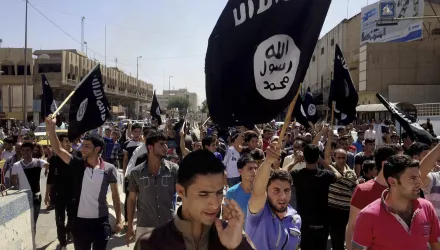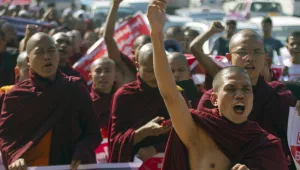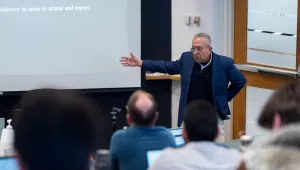During a week-long working study-tour to Poland last week to explore several aspects of Polish recent history that struck me as pertinent to current developments in the Arab world, I made sure that I had the opportunity to visit the Gdansk shipyards where the Solidarity labor movement was born in 1980. I have long admired that movement’s pivotal role in initiating workers’ strikes and sit-ins, collective bargaining, political negotiations and, ultimately, an agreement in 1989 with the Soviet Union for a liberalization of political governance in Poland. That year, the Soviet Empire collapsed like the hollowed hulk of rusted steel that it had become after decades of deadening Communist dictatorship.
I met and interviewed the founding leader of Solidarity, Lech Walesa, on the assumption that our Arab struggle for liberty and dignity could benefit from lessons he drew from his historic experiences and achievements that ended the Soviet universe in the period 1970-1990. I was not disappointed.
Our hour-long discussion reflected a few key issues like organization and strategy, the role of faith, and understanding one’s struggle within its wider regional or global contexts. Central to their success in achieving labor and wider political rights was the importance of organizing patiently and steadily over many years, using non-violent methods, and communicating and coordinating regularly with colleagues in labor and intellectual circles across Europe. These were critical moves because armed resistance, street violence, or traditional strikes could not triumph against the overwhelming might of the Soviet military that managed the puppet government in Poland.
“The only way for us to be strong was to organize within large factories which provided us with the big social base we needed to succeed. The police and army found it difficult to enter large plants, especially when strikes and sit-ins occurred simultaneously in many places due to our constant coordination,” he recalled.
He mentioned faith as a critical success factor, meaning the role of the Catholic Church and Pope John Paul II who visited his native Poland and also received Walesa at the Vatican. He recalled: “The Pope’s visits made a big difference. His public masses drew massive crowds that speeded up our growth to the strong social base of ten million members of Solidarity, and faith gave us courage to confront the powerful alien enemy we faced. The 2000th anniversary of Christianity also helped. We took big risks and always faced the possibility of a military crackdown, without having the capabilities to protect ourselves. While the Soviets showed our generals the missiles pointed at major Polish cities, we did not have any protection against such threats other than our courage, our faith, and our ability to organize and be patient. We released the power of the human spirit in response to their threat of missiles.”
Recognizing that victory would only come cumulatively and in stages, Walesa said their movement’s non-violent resistance, protest and strikes always included demanding practical, limited rights from the state, rather than asking for impossible concessions. “We also made sure that our demands from the government always responded to the practical needs of our popular base, which allowed us to mobilize ten million members and maintain cohesion.”
By the 1980s, the advent of Mikhail Gorbachev’s rule in Moscow, Ronald Reagan’s increased defense spending in Washington, and the Soviet debacle in Afghanistan weakened the Soviet system and signaled its likely collapse. Some Polish rulers under Russia’s thumb who saw this quietly did not defend the system strongly, which made it easier for Solidarity to negotiate with the external Russian enemy it faced, he said.
Walesa led the first independent free labor movement in the Soviet world, and in 1990 was elected president of the democratic country, only to lose his luster a decade later when his party was badly defeated in the 2000 elections. What lessons does he retain from managing a democratic system?
“I believe from experience that three crucial elements are needed in a democracy,” he replied. “The rule of law, economic well-being, and engagement with the people.”
Does he see any new threats in Poland or Europe that require new forms of activism and popular mobilization such as what Solidarity did?
“I think we are on the verge of major change and perhaps upheaval all over the world,” he said, “directed against capitalism and the practice of democracy in its current form. Protests all over the world scared me in recent years, but they pointed out the excesses of capitalism and the demagogic political class in many countries. The elites must hear the people’s calls in such situations.
“Every lesson and experience adapts to its time and place, and some things exhaust themselves with time. I would give one piece of advice to activists today: act like good bacteria, and do not destroy the organism you live in. Leaders, for their part, must be like football coaches, not doing too much or too little, increasing pressure gradually, and not subjecting people to excess stress.”
Khouri, Rami. “Lech Walesa on liberty and struggle.” Agence Global, June 8, 2015





